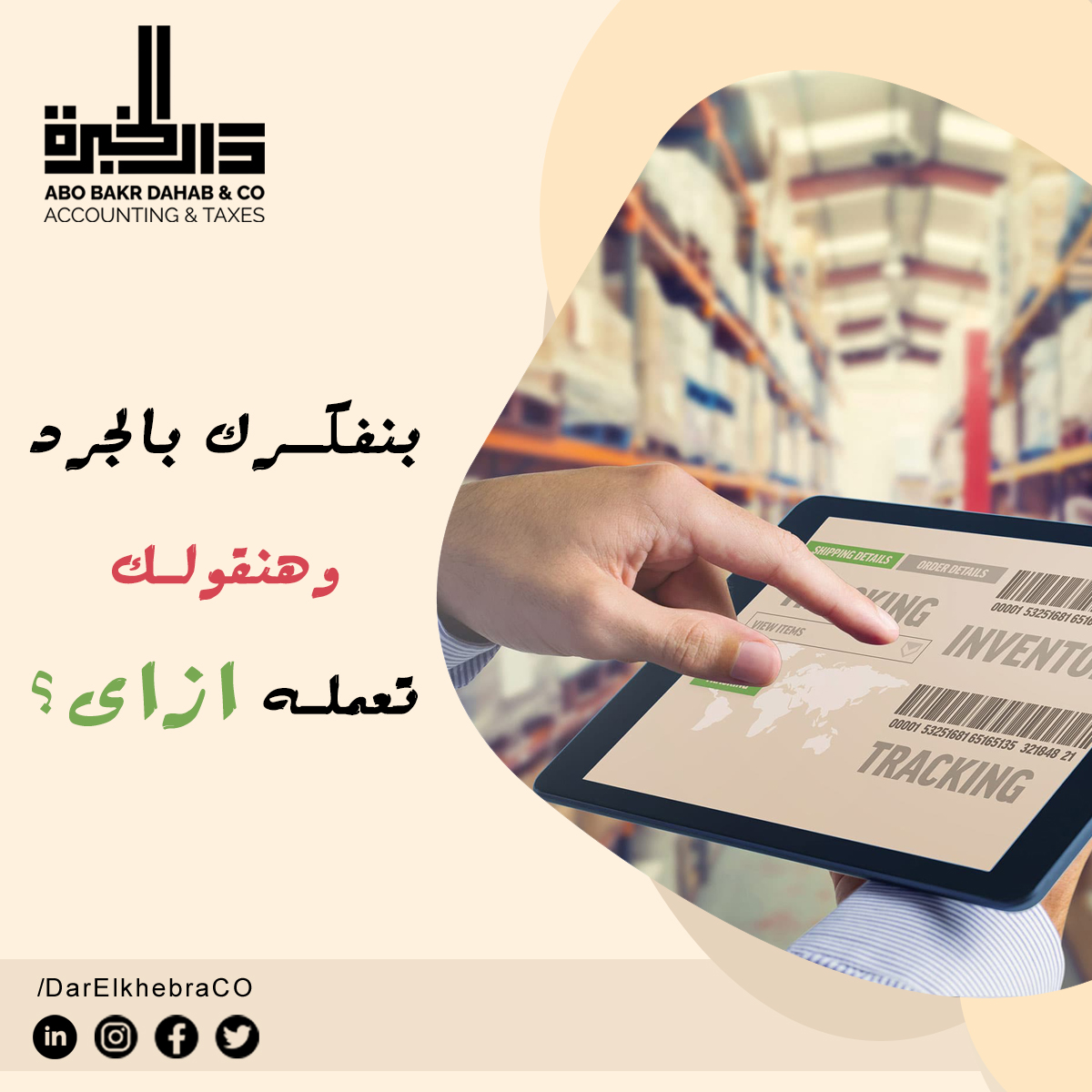Inventory valuation




Reda Abdel Qader, Assistant Minister of Finance for Tax Authority Affairs, stressed the keenness of the Ministry of Finance and the Egyptian Tax Authority to facilitate financiers to join the electronic receipt system, especially since the implementation of the second phase of the electronic receipt system begins on October 1, pointing out that the total of sent receipts has reached The system has so far nearly 14 million receipts.
Reda Abdel Qader added that the electronic receipt system is a natural extension of the electronic invoice system to cover all types and forms of electronic transactions from all parties, pointing out that the electronic receipt system aims to contribute to the integration of the informal economy into the formal economy, and the formation of an accurate database that can be relied upon. Subsequently, it must implement data analysis and decision support systems, achieve the principle of equal opportunities among financiers in the Egyptian market, and collect dues from the state’s public treasury.
Mokhtar Tawfik, head of the Egyptian Tax Authority, indicated that the authority provides full support to the financiers who are obligated to join the electronic receipt system, as several workshops are held with the funders of the second phase of the electronic receipt system, to introduce the system and how technical integration with it, calling on the funders of the second phase of the receipt system to need Attending workshops organized by the authority to benefit from them in integrating with the system before the date of the obligation.
The head of the Egyptian Tax Authority clarified that the financiers who are obligated to the first and second stages of the electronic receipt system, and for whom mandatory decisions No. (289) for the year 2022 and (345) for the year 2022 have been issued, can send their inquiries to the following
E-mail : eReceipt.hd@eta.gov.eg
He added that they can also contact the authority’s integrated call center to respond to all inquiries on the hotline 16395.
The head of the Egyptian Tax Authority added that the electronic receipt system is based on the establishment of a central electronic system that enables the Tax Authority to follow up all commercial transactions for the sale of goods and the provision of services between sellers in sales and service centers and between consumers (B2C), moment by moment, and verify their validity through electronic integration. With vending machines at merchants and service providers (POS) by installing sales monitoring devices in them.

Head of Tax and Customs Committee at FEI, highlighted:
—————————–
“We are strongly continuing the implementation of the national project of updating and automating customs management system, according to the presidential directions to facilitate the internal and external trade flows, along with reducing the cost of importation and exportation, decreasing the time of customs clearance and price of goods and services in the domestic markets” Minister of Finance, Dr. Mohamed Maait, assured.
The national single e-portal for national trade “Nafeza” has been updated, and a new version of smart phones’ application has been developed to facilitate procedures for the business community. Accordingly, importers and their customs agents will be able to access the customs system through their smart phones, Dr. Maait also noted.
“Importers may add electronic sub-accounts for their customs agents via the single online e-portal “Nafeza”. Besides, companies’ delegates are allowed to create electronic sub-accounts at the e-portal; thus, helping the business community to electronically follow their consignments, the minister added.
The minister further pointed out the importance of strengthening effective communication with business community to overcome any obstacles and facilitate procedures of joining the ACI system, especially given the fact that, as of next October the first, no inbound shipments shall be allowed to enter through seaports except through ACI application.
He noted that there is a continuous coordination with line bodies of the government to ensure the optimal implementation of ACI. Directions from the Cabinet have been issued for the General Organization for Export and Import Control to not renew or issue new records for neither the importers nor exporters or owners of industrial activity or their customs agents, except for ACI- joined companies, starting from mid-August 2021. In addition, there will not be “export support” for the companies who did not join ACI and electronic bill systems, starting from beginning of October 2021.
In that respect, Head of Customs Authority, Elshahat Ghetory, held an open dialogue with members of the Federation of Egyptian Industries (FEI) in a seminar about customs procedures to the ACI system, assuring that “we continue holding seminars and training workshops in coordination with Misr Technology Services (MTS) for all Customs Authority’s stakeholders; whether being importers, cargo owners or customs agents.
He explained that the unified electronic platform for the domestic trade “ACI” covers more than 90% of the Egyptian imports, and will extend to Safajah, Newbie, Ismailia, and Aswan before the end of this year, hence there will be an electronic link among all custom ports.
He also added that there is a joint committee with the Federation of Egyptian Industries (FEI) to foster communication with the business community and to ensure positive interaction with them; thus, facilitating the procedures of joining the ACI system.
On his part, Dr. Mohamed El-Bahey, head of tax and customs committee at FEI, expressed his appreciation for Dr. Mohamed Maait for his kind response towards the business community’s suggestions, and for taking instant procedures to facilitate the status for business community and encouraging them to join the new system. This positive interaction helps in raising the spirit of optimism and confidence on the part of investors. The minster also called on companies’ owners to register through ACI system before obligatory putting it into force starting from the beginning of October 2021, so as to eventually achieve the desired objective of reducing shipments’ customs clearance time
The said seminar was attended by Dr. Mona Naser, finance minister assistant for customs’ monitoring and development; Mr. Ibrahim Elsegeny, assistant of minister of trade and industry for economic affairs; Mrs. Nagwa Shehata, head of central department of customs’ policies and procedures; Mr. Mohamed Gomaa, head of central department of trade community affairs; Mr. Waleed Hussein, general manager of technical office of the head of customs authority; Eng. Khaled Nasef Selim, consultant of head of Misr Technology Services (MTS); as well as FEI members and stakeholders.